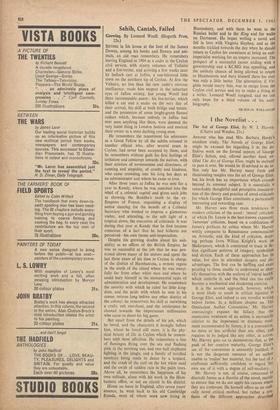Sahib, Cantab, Failed
SirrriNo in his house at the foot of the Sussex Downs. among his books and flowers and ani- mals, an old man remembers. He remembers leaving England in 1904 as a cadet in the Ceylon civil service, with ninety volumes of Voltaire and a fox-terrier, and arriving a few weeks later by bullock cart at Jaffna, a sun-blistered little town on the northern tip of Ceylon. At first the Voltaire, no less than the new cadet's obvious intelligence, made him suspect in the suburban eyes of Jaffna society, but young Woolf had three incontestable assets: his fox-terrier, which killed a cat and a snake on the very day of their arrival; his skill at both bridge and tennis; and the possession of some bright-green flannel collars which, because 'nobody in Jaffna had ever seen anything like them, were deemed the very latest thing in London fashion and marked their owner as a most dashing young man.
He remembers the resentment his admission as a Good Fellow by all the sahibs aroused in another official who, after several years in Ceylon, had never been accepted by them; and he remembers without guilt his first feelings of irritation and contempt towards the natives, with their mixture of tortuousness and directness, of cunning and stupidity, of cruelty and kindness, who came crowding into his long hot days as an administrator and whom he came to love.
After three years at Jaffna he was sent for a year to Kandy, where he was snatched into the whirl of a colonial capital and given such jobs as showing the Buddha's tooth to the ex- Empress of France, organising a display of native dancing for the benefit of a Colonial Secretary who wanted to impress a glamorous visitor, and attending, in the soft light of a tropical dawn, the execution of criminals. It was during that year at Kandy that he first became conscious of a fact that he had hitherto not perceived—his own innate anti-imperialism.
Despite his growing doubts about his suit- ability as an officer of the British Empire, he was so successful at the job that he was pro- moted above many of his seniors and spent the last three years of his time in Ceylon in charge of the district of Hambantota, a remote region in the south of the island where he was merci- fully far from other white men and where he could bury himself in the monumental tasks of administration and development. He remembers the severity with which he ruled his little king- dom, and the pride with which he sent in his census returns long before any other district of the colony; he rememhers his skill at outwitting a crafty salt merchant, and the intolerance he showed towards the importunate millionaires who came to shoot his big game.
But apart from the details of his job, which he loved, and the characters it brought before him, whom he loved still more, it is the phy- sical beauty of life in Ceylon which he remem- bers with most affection. He remembers a line of flamingos flying over the sea and flashing pink in the morning sun, and two bull elephants fighting in the jungle, and a family of terrified monkeys being made to dance by a leopard, and the crash of the surf on the hot white sand and the swish of sudden rain in the palm trees. Above all, he remembers the happiness of his own solitude, alone with his work in the Ham- bantota office, or out on circuit in his district.
Home on leave in England, after seven years' absence, he went back ' to his old Cambridge friends, most of whom were now living in
Bloomsbury, and with them he went to the Russian ballet and to the Ring and for walks on Dartmoor. He began writing a novel and fell in love with Virginia Stephen, and as the months trickled towards the day when he should return to Ceylon his uneasiness at being an anti- imperialist working for an empire increased. The prospect of a successful career ending with a governorship and a KCMG was appalling, and the unlikely chance of being allowed to return to Hambantota and bury himself there for ever was only a little better. The alternative, if Vir- ginia would marry him, was to resign from the Ceylon civil service and try to make a living as a writer. Leonard Woolf resigned, and we can only hope for a third volume of his auto- biography.
NICHOLAS WOLLASI ON






































 Previous page
Previous page